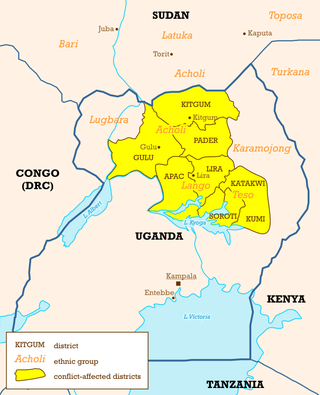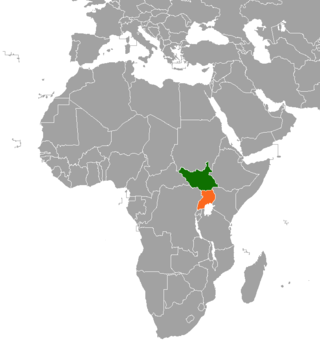
In the aftermath of the Ugandan Civil War, Ugandan militant Joseph Kony formed the Lord's Resistance Army and waged an insurgency against the newly-installed president Yoweri Museveni. The stated goal was to establish a Christian state based on the Ten Commandments. Currently, there is low-level LRA activity in the eastern Democratic Republic of the Congo and the Central African Republic. Kony proclaims himself the "spokesperson" of God and a spirit medium.

The First Congo War (1996–1997), also nicknamed Africa's First World War, was a civil war and international military conflict which took place mostly in Zaire, with major spillovers into Sudan and Uganda. The conflict culminated in a foreign invasion that replaced Zairean president Mobutu Sese Seko with the rebel leader Laurent-Désiré Kabila. Kabila's unstable government subsequently came into conflict with his allies, setting the stage for the Second Congo War in 1998–2003.
Yambio is a city in South Sudan.

The start of the period 1994 to 2002 of the Lord's Resistance Army insurgency in northern Uganda saw the conflict intensifying due to Sudanese support to the rebels. There was a peak of bloodshed in the mid-1990s and then a gradual subsiding of the conflict. Violence was renewed beginning with the offensive by the Uganda People's Defence Force in 2002.
The period from 2000 to 2006 of the Lord's Resistance Army insurgency in northern Uganda begins with the assault of the Uganda People's Defence Force (UPDF) upon LRA strongholds in South Sudan. This in turn led to a series of retaliatory attacks by the Lord's Resistance Army of an intensity not seen to since the mid-1990s. International awareness of the conflict gradually grew and in September 2005, the International Criminal Court issues warrants for the arrest of senior LRA commanders, including Joseph Kony.

Dungu is a town in Haut-Uele Province located at the confluence of the Dungu and Kibali Rivers where they join to form the Uele River, south of the Garamba National Park. Dungu's terrain is wooded savannah, and its climate is tropical.

Magwi County, also Magwe County, is a county in Eastern Equatoria, South Sudan.

The Lord's Resistance Army (LRA) is a Christian extremist organization which operates in northern Uganda, South Sudan, Sudan, the Central African Republic, and the Democratic Republic of the Congo. Its stated goal includes the establishment of multi-party democracy in a Uganda bound by the Ten Commandments.
The 2008–2009 Garamba offensive started on 14 December 2008, when joint Ugandan, DR Congolese and Southern Sudanese forces launched a botched military attack against the Lord's Resistance Army (LRA) in the Garamba region of DR Congo.

The 2008 Christmas massacres took place on 24–27 December 2008, when the Lord's Resistance Army (LRA), a Ugandan rebel group, attacked several villages in Haut-Uele District, Democratic Republic of the Congo.

The Makombo massacre took place from 14 to 17 December 2009 in the Haut-Uele District of Democratic Republic of the Congo in the village and region of Makombo. Human Rights Watch (HRW) believes the attacks, which killed 321 people, were perpetrated by the Lord's Resistance Army (LRA), which denied responsibility.

South Sudan and Uganda are neighboring states with strong cultural economic and political ties. The South Sudan and the neighbouring state of Uganda enjoy relatively strong cultural, political, and economic ties. As South Sudan neared independence, both states begun to take advantage of increased opportunities for trade, development and educational exchanges. The rebel group Lord's Resistance Army (LRA), however, continues to operate in the border areas between South Sudan, the Democratic Republic of Congo and Uganda.
Dungu is a territory in the Haut-Uele Province of the Democratic Republic of the Congo. The administrative center is the town of Dungu, which lies on both sides of the Uele River. The territory is divided into the Ndoromo, Maringindo and Wandu chiefdoms.

Faradje is a town in the Haut-Uele province of the Democratic Republic of the Congo and is the administrative center of Faradje Territory. It lies on the Dungu River.

Gbudwe State was a state of South Sudan that existed between 2 October 2015 and 22 February 2020. It was created from Western Equatoria state. Tambura State was split from Gbudwe State on January 14, 2017. Gbudwe State was located in the Equatoria region. Gbudwe bordered the states of Lol, Maridi, Tambura, and Western Lakes, and also the province of Haut-Uélé in the Democratic Republic of the Congo and Haut-Mbomou in the Central African Republic. The state had a population of 364,272 in 2008.
The Regional Cooperation Initiative for the elimination of the LRA (RCI-LRA) with its military arm, the African Union Regional Task Force was a multi-national operation to counter the Lord's Resistance Army (LRA). On 22 November 2011 the AU Peace and Security Council authorized the RCI-LRA with the mandate to "strengthen the operational capabilities of the countries affected by the atrocities of the LRA, create an environment conducive to the stabilization of the affected areas, free of LRA atrocities, and facilitate the delivery of humanitarian aid to affected areas." The United Nations provided logistical support, the European Union and African Union contributed additional funding, and the United States provided non-combat military and strategic support.
Operation Thunderbolt was the codename for a military offensive by the South Sudanese SPLA rebel group and its allies during the Second Sudanese Civil War. The operation aimed at conquering several towns in Western and Central Equatoria, most importantly Yei, which served as strongholds for the Sudanese Armed Forces (SAF) and helped the Sudanese government to supply its allies, the Ugandan insurgents of the WNBF and UNRF (II) based in Zaire. These pro-Sudanese forces were defeated and driven from Zaire by the SPLA and its allies, namely Uganda and the AFDL, in course of the First Congo War, thus allowing the SPLA launch Operation Thunderbolt from the Zairian side of the border. Covertly supported by expeditionary forces from Uganda, Ethiopia, and Eritrea, the SPLA's offensive was a major success, with several SAF garrison towns falling to the South Sudanese rebels in a matter of days. Yei was encircled and put under siege on 11 March 1997. At the same time, a large group of WNBF fighters as well as SAF, FAZ, and ex-Rwandan Armed Forces soldiers was trying to escape from Zaire to Yei. The column was ambushed and destroyed by the SPLA, allowing it to capture Yei shortly afterward. Following this victory, the South Sudanese rebels continued their offensive until late April, capturing several other towns in Equatoria and preparing further anti-government campaigns.
Richard Domba Mady was a Congolese Roman Catholic prelate. He served as the third Bishop of the Roman Catholic Diocese of Doruma–Dungu, located in northeast Democratic Republic of the Congo, from his installation on 31 July 1994 until his death on 3 July 2021. During his tenure, his diocese endured a series of attacks during the numerous conflicts affecting the eastern Democratic Republic of Congo, including the First Congo War, the Second Congo War, and the aftermath of these wars.
The Duru River is a river of the Haut-Uélé province of the Democratic Republic of the Congo. It is a right tributary of the Uele River.
Bangadi is a town located in Haut-Uele Province, Democratic Republic of the Congo.












